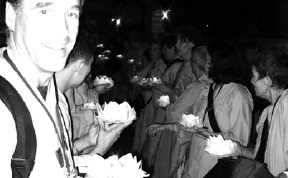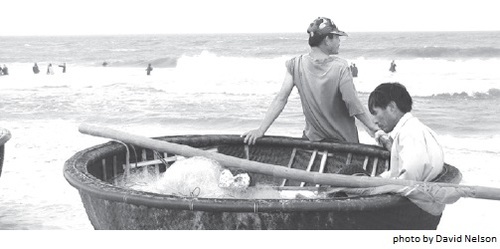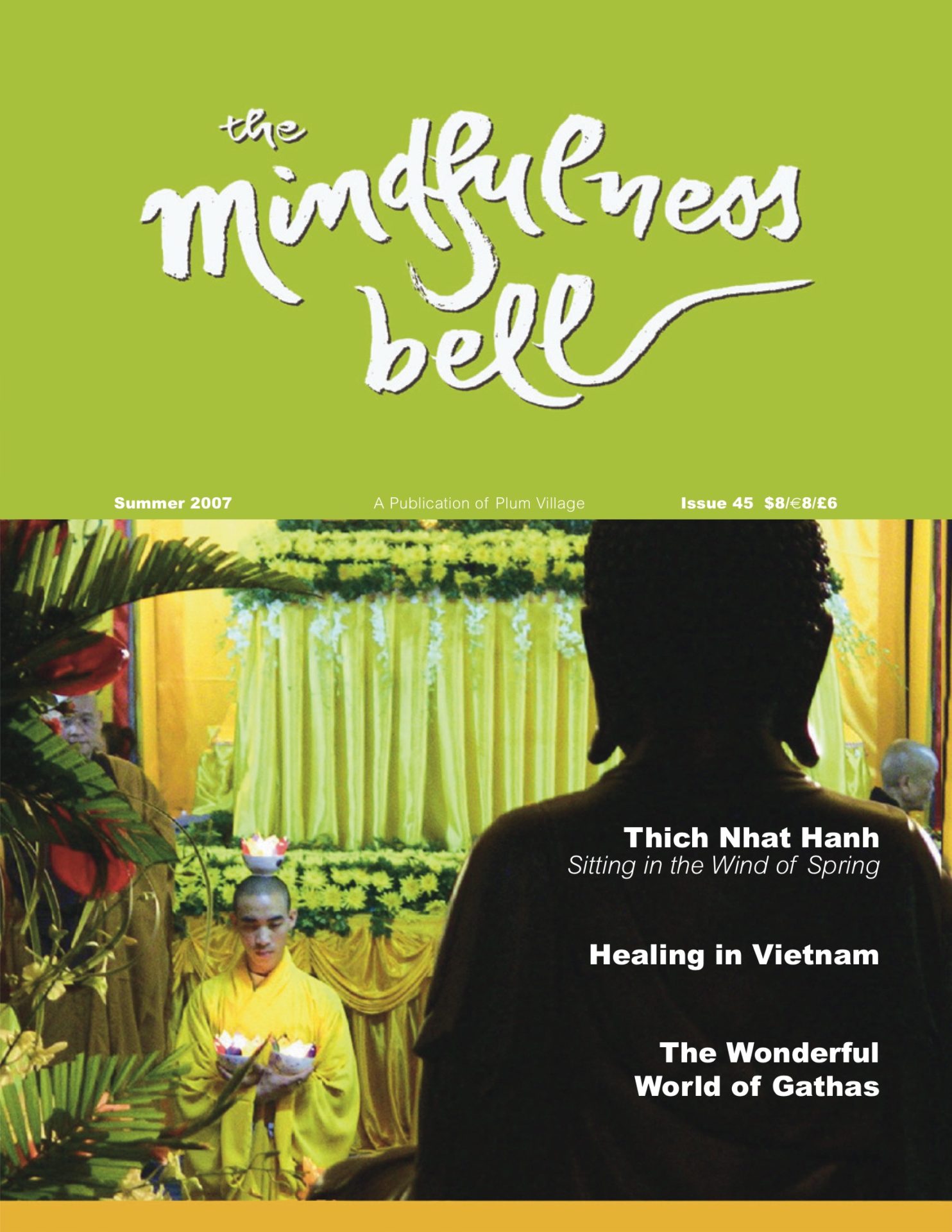Heart to Heart is a new section of the Mindfulness Bell — for you to express your thoughts and share your practice on a given topic. In this issue we focus on the Second Mindfulness Training (of the Five). For the Autumn 2007 issue, we invite you to write on the Third; please send your submissions, under 500 words, to editor@mindfulnessbell.org by July 1, 2007.

The Second Mindfulness Training
Aware of the suffering caused by exploitation,
Heart to Heart is a new section of the Mindfulness Bell — for you to express your thoughts and share your practice on a given topic. In this issue we focus on the Second Mindfulness Training (of the Five). For the Autumn 2007 issue, we invite you to write on the Third; please send your submissions, under 500 words, to editor@mindfulnessbell.org by July 1, 2007.

The Second Mindfulness Training
Aware of the suffering caused by exploitation, social injustice, stealing and oppression, I am committed to cultivating loving-kindness and learning ways to work for the well-being of people, animals, plants and minerals. I will practice generosity by sharing my time, energy and material resources with those who are in real need. I am determined not to steal and not to possess anything that should belong to others. I will respect the property of others, but I will prevent others from profiting from human suffering or the suffering of other species on Earth.

Aware of the realities of today’s global economy, I realize that as a U.S. citizen it is impossible for me to live without stealing from and exploiting someone else somewhere in the world. Though I try to live and consume mindfully, I know that my own lifestyle rests on the exploitation of others. It is, for instance, almost impossible to buy clothes not made in sweatshops, where the workers (mostly young women of color) are treated mercilessly — forced to work twelve-to sixteen-hour days, six to seven days a week; paid a pittance that is sometimes not even enough to live on; sometimes forced to work unpaid overtime; subject to sexual harassment by their bosses; and forbidden to form labor unions that might empower them to work for better conditions. Most likely, the computer on which I write this was also made under such conditions, as were many of the other things I use in my daily life. In order to cultivate mindfulness of these grim realities, when I put on my clothes in the morning, I look at the tags on my clothing to see where they were made. Then I try to visualize the workers, while reciting this gatha: “As I get dressed, I remember with gratitude those who made my clothes, and with compassion, the conditions under which they work.”
I do try to consume mindfully and ethically where I can--buying recycled paper goods, ecologically friendly cleaning products, cage-free eggs, leather-free shoes — but there are limits to what I can do as an individual. Understanding interbeing, I see that many of my choices are conditioned by the larger global society of which we are all a part. I cannot buy products that were not made in sweatshops if they are not available to me when I go shopping — unavailable, because our economy is built on the principle of maximizing profits ahead of human and ecological needs. It is a race to the bottom, where corporations compete with each other, scouring the world for ever cheaper labor, and third-world governments compete with each other to attract business by providing this ever cheaper labor. Even my ability to buy those ethically sound products that I can rests on my own economic privilege, the fact that I can afford to spend a little extra money and such economic privilege inevitably rests on a system where others lack such privilege, living lives of poverty and exploitation. Understanding interbeing, I see that however mindful my actions, I still participate in a society based on theft and exploitation.
Understanding interbeing, I see that if I wish to live a life where I and others do not steal from and exploit others, it is not enough to look at my own individual choices when I go shopping. We must work together, collectively, to change the shape of our global society — to create an economy where, at the very least, everyone has a job where they are paid a living wage, treated with dignity, and allowed to form unions that can give collective voice to their concerns. The public good must be given greater priority than private profit. Only then will we all be able to live in a way that we do not have to steal from and exploit others.
Matthew S. Williams Reverent Joy of the Heart
Boston, Massachusetts, USA

Thay often says that if you have never gone hungry, you won’t appreciate the value of food. You take your safety, your freedom to move around, for granted. When you live behind locked doors, and don’t feel safe on the streets or walking in the countryside alone, then you know how valuable is the freedom to move around safely. This is not a freedom that we enjoy in our country, South Africa.
I live in a country where it is not safe to leave your doors open. You normally lock your doors when you go out, but we have to keep them locked even when we are at home, because this is the best time for criminals — they don’t have to break and enter --they just enter. This is not a nice way to live — behind bars in a kind of private prison to keep you safe in your own home.

We have one of the highest crime rates in the world, and much of it is violent crime. The situation in South Africa has come to be because of the past history and collective karma that we have created. Everybody knows the story of Apartheid. The past is past, but it is still with us in the present moment. We have to work very hard to change it and to create a better future. We have undergone major transformation in our country under the bodhisattva Nelson Mandela, but social change takes much longer than political change.
We live in a hard country, and it can make you a hard person, or it can soften you and make you more compassionate. I used to be hard and uncaring before I encountered the Dharma. Since then I am constantly trying to increase my compassion, open my heart wider, and become a bodhisattva. I think of the bodhisattvas who go to the darkest places in order to help, and sometimes it feels like this path was given to me by default. “Darkest Africa” is my home, and many bodhisattvas are needed on this continent, which is plagued by tribal wars, famine, AIDS, poverty, and crime.
As aspiring bodhisattvas, there are many teachings to help us cultivate our capacity to love:
- The teaching on Buddha nature: All beings are the same, we all have the same potential, we all want happiness and don’t want suffering.
- The teaching on cause and effect: We take responsibility for what we are experiencing without blaming others. It is our own karma; we are reaping what we sowed. Even if we personally did nothing in this particular lifetime, we may have contributed through our non-action, our apathy.
- The teaching on dependent origination: Everything depends on causes and conditions. Nobody is inherently “bad” — people act in certain ways because of causes and conditions that are often beyond their control. This understanding helps us to cultivate compassion, to open the door of our heart so that we can love instead of hate. Thay’s poem “Please Call Me by My True Names” about the sea pirate, helped me a lot. Here is an excerpt:
I am the 12 year old girl,
refugee on a small boat,
who throws herself into the ocean
after being raped by a sea pirate.
And I am the pirate,
my heart not yet capable
of seeing and loving.
Please call me by my true names,
so I can hear all my cries and laughter at once,
so I can see that my joy and pain are one.
Please call me by my true names
so I can wake up
and the door of my heart
could be left open
the door of compassion.
These wonderful teachings help us to transform our minds, our emotions, our ways of being. We do this for ourselves and for the world, to relieve ourselves of suffering and to create a better world in the future because happiness and suffering are universal. I know that if you suffer, you will make me suffer. We know that if we exploit people or take unfair advantage of them, oppress them, discriminate against them on grounds of race, culture, religion, gender, we are committing a kind of theft — we are stealing their dignity to be who they are. This will make them suffer and it will make us suffer, because one day their suffering will impact on our lives and become our suffering as well.
We are all creators. We are creating all the time. We are responsible for creating the kind of world that we live in, and this is why the Mindfulness Trainings are so important. We must learn from the mistakes of the past so that we can create a better future based on love not fear, on giving not getting, on helping not harming, on supporting not exploiting, on building up not breaking down, on creating the conditions for happiness not suffering. Then we can all live in the Pure Land. The Buddha said:
If you want to know your past lives,
Look into your present condition.
If you want to know your future,
Look into your present actions.
Carol Leela Verity True Stream of Light
Plettenberg Bay, South Africa

